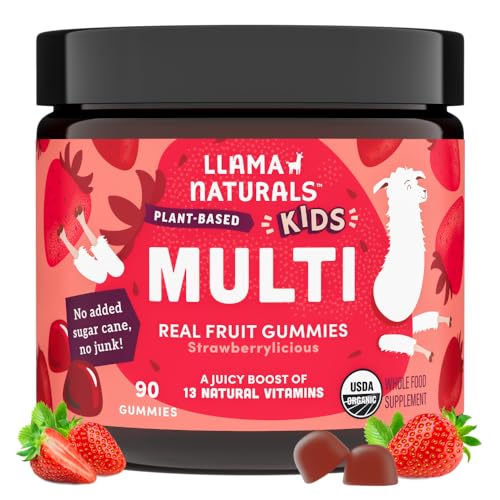

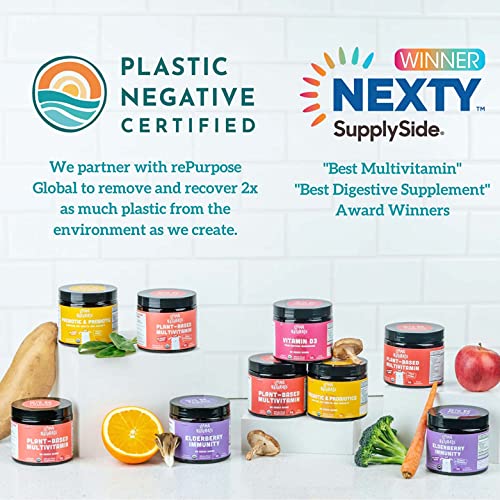
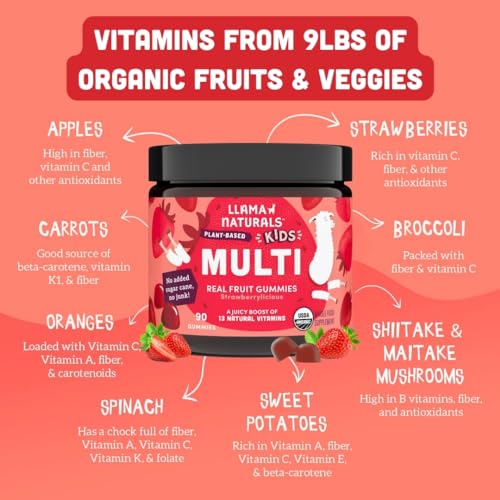
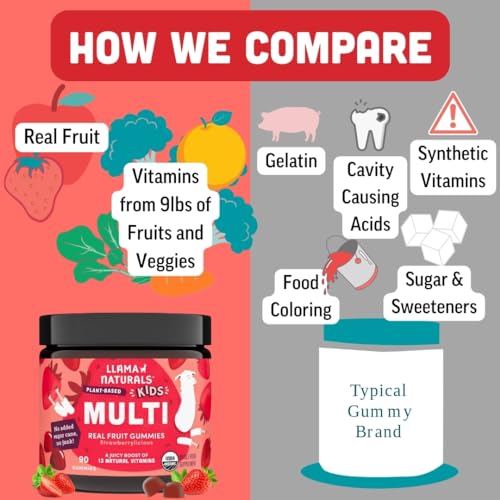

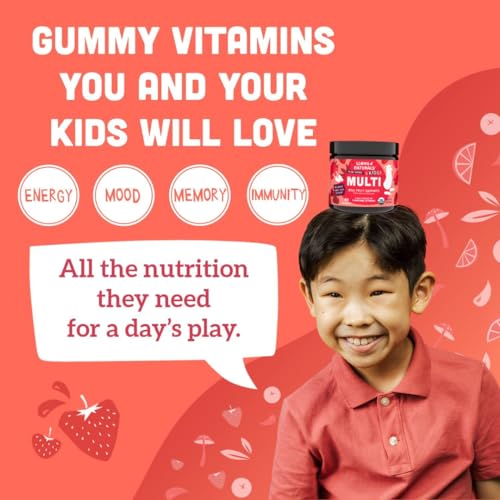
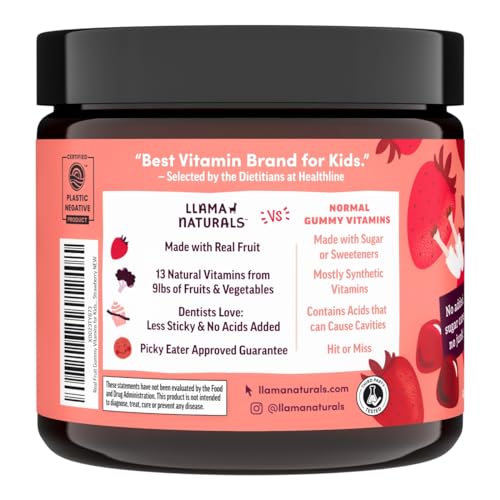
Llama Naturals Multivitamin Gummies - Supports Kids’ Development, Organic & Vegan - 90 ct Strawberry


Spinacia Oleracea (Spinach)
Low RiskSpinacia oleracea (spinach) is a leafy green vegetable known for its nutrient density and is commonly used in various food products for its flavor and health benefits. It contains vitamins, minerals, and antioxidants, making it a popular ingredient in salads, smoothies, and dietary supplements.
Sustai Insights
Spinach offers functional benefits such as nutrient enrichment and antioxidant properties, contributing positively to health. It is sustainably sourced and biodegradable. Health risks are minimal, with low concerns regarding carcinogenicity, allergies, or reproductive toxicity. Environmental hazards are low, and it poses no regulatory warnings. Overall, it is assessed as a low-risk ingredient suitable for various uses.
Biotin
Low RiskBiotin, also known as vitamin B7, is a water-soluble vitamin that plays a crucial role in the metabolism of carbohydrates, fats, and proteins. It is commonly used in dietary supplements and cosmetic products to support healthy hair, skin, and nails, due to its involvement in keratin synthesis.
Sustai Insights
Biotin is recognized for its functional benefits, particularly in promoting hair and skin health. It is generally considered safe, with low concerns regarding carcinogenicity, allergenic potential, and reproductive toxicity. Regulatory bodies such as the FDA have no significant restrictions on its use, and it is not associated with substantial environmental risks. Overall, biotin is assessed to be low risk, making it a viable ingredient in various formulations. Safe usage practices include adhering to recommended dosages, and alternatives may be considered for those seeking plant-based or vegan options.
Ascorbic Acid (Vitamin C)
Low RiskAscorbic acid (Vitamin C) is a naturally occurring antioxidant essential for various biological functions, including collagen synthesis and immune response. It is commonly used in cosmetic and food products for its preservative properties and ability to enhance skin brightness.
Sustai Insights
Ascorbic acid provides functional benefits as an effective antioxidant and preservative, contributing to skin health and product stability. It is generally recognized as safe with low health risks, including minimal concerns for carcinogenicity and allergies. Environmentally, it poses low risks, as it is biodegradable and does not bioaccumulate. Regulatory bodies like the FDA have not imposed significant restrictions on its use. Overall, the ingredient presents a low risk, with safe usage practices ensuring consumer safety, and alternatives such as natural extracts exist for those seeking different formulations.
Helianthus Annuus (Sunflower) Seed
Low RiskHelianthus annuus (sunflower) seed is derived from the seeds of the sunflower plant and is commonly used in various cosmetic and personal care products. It serves primarily as an emollient and skin conditioning agent, providing moisture and enhancing the texture of formulations.
Sustai Insights
Helianthus annuus (sunflower) seed offers functional benefits, including skin conditioning and moisturizing properties, while being sustainably sourced and biodegradable. Health risks are minimal, with low concerns for carcinogenicity, allergies, and reproductive toxicity. Environmentally, it presents low risks of pollution or bioaccumulation. Regulatory assessments indicate no current restrictions. Overall, it is considered a low-risk ingredient, and safe usage practices should be maintained. Alternative ingredients may include other plant-based oils, but the sunflower seed oil remains a viable option.
Vitamin B3
Low RiskVitamin B3, also known as niacin or nicotinic acid, is an organic compound that plays a crucial role in various metabolic processes in the body. It is commonly used in cosmetic formulations for its ability to improve skin texture and enhance moisture retention, thereby contributing to overall skin health.
Sustai Insights
Vitamin B3 offers functional benefits such as improving skin hydration, reducing the appearance of fine lines, and enhancing overall skin tone. It is generally recognized as safe, with low associated health risks, including minimal concerns for carcinogenicity, allergies, or reproductive toxicity. Environmentally, it poses low risks and is not classified as a pollutant or bioaccumulative. Regulatory bodies have not placed substantial restrictions on its use, affirming its safety in cosmetic applications. Overall, Vitamin B3 is considered a low-risk ingredient, with no significant adverse effects reported. Safe usage practices include using within recommended concentrations, and alternatives like Vitamin B5 can be considered for similar benefits.
Ci 75130
Low RiskBeta carotene is a carotenoid compound primarily sourced from fruits and vegetables that provides coloration and is a precursor to vitamin A. It is often used in food products, cosmetics, and dietary supplements for its antioxidant properties and potential health benefits.
Sustai Insights
Beta carotene is recognized for its role as an antioxidant and a source of vitamin A, contributing to skin health and immune function. It is derived from sustainable sources, though it has moderate bioaccumulation potential. Health risks are low, with no significant concerns regarding carcinogenicity, allergies, or reproductive toxicity. Regulatory bodies have noted its use restrictions, but overall, it presents low risks to health and the environment. Safe usage practices should be followed, and alternatives such as other carotenoids or natural colorants may be considered.
Spinacia Oleracea (Spinach)
Low RiskSpinacia oleracea (spinach) is a leafy green vegetable known for its nutrient density and is commonly used in various food products for its flavor and health benefits. It contains vitamins, minerals, and antioxidants, making it a popular ingredient in salads, smoothies, and dietary supplements.
Sustai Insights
Spinach offers functional benefits such as nutrient enrichment and antioxidant properties, contributing positively to health. It is sustainably sourced and biodegradable. Health risks are minimal, with low concerns regarding carcinogenicity, allergies, or reproductive toxicity. Environmental hazards are low, and it poses no regulatory warnings. Overall, it is assessed as a low-risk ingredient suitable for various uses.
Biotin
Low RiskBiotin, also known as vitamin B7, is a water-soluble vitamin that plays a crucial role in the metabolism of carbohydrates, fats, and proteins. It is commonly used in dietary supplements and cosmetic products to support healthy hair, skin, and nails, due to its involvement in keratin synthesis.
Sustai Insights
Biotin is recognized for its functional benefits, particularly in promoting hair and skin health. It is generally considered safe, with low concerns regarding carcinogenicity, allergenic potential, and reproductive toxicity. Regulatory bodies such as the FDA have no significant restrictions on its use, and it is not associated with substantial environmental risks. Overall, biotin is assessed to be low risk, making it a viable ingredient in various formulations. Safe usage practices include adhering to recommended dosages, and alternatives may be considered for those seeking plant-based or vegan options.
Ascorbic Acid (Vitamin C)
Low RiskAscorbic acid (Vitamin C) is a naturally occurring antioxidant essential for various biological functions, including collagen synthesis and immune response. It is commonly used in cosmetic and food products for its preservative properties and ability to enhance skin brightness.
Sustai Insights
Ascorbic acid provides functional benefits as an effective antioxidant and preservative, contributing to skin health and product stability. It is generally recognized as safe with low health risks, including minimal concerns for carcinogenicity and allergies. Environmentally, it poses low risks, as it is biodegradable and does not bioaccumulate. Regulatory bodies like the FDA have not imposed significant restrictions on its use. Overall, the ingredient presents a low risk, with safe usage practices ensuring consumer safety, and alternatives such as natural extracts exist for those seeking different formulations.
Helianthus Annuus (Sunflower) Seed
Low RiskHelianthus annuus (sunflower) seed is derived from the seeds of the sunflower plant and is commonly used in various cosmetic and personal care products. It serves primarily as an emollient and skin conditioning agent, providing moisture and enhancing the texture of formulations.
Sustai Insights
Helianthus annuus (sunflower) seed offers functional benefits, including skin conditioning and moisturizing properties, while being sustainably sourced and biodegradable. Health risks are minimal, with low concerns for carcinogenicity, allergies, and reproductive toxicity. Environmentally, it presents low risks of pollution or bioaccumulation. Regulatory assessments indicate no current restrictions. Overall, it is considered a low-risk ingredient, and safe usage practices should be maintained. Alternative ingredients may include other plant-based oils, but the sunflower seed oil remains a viable option.
Vitamin B3
Low RiskVitamin B3, also known as niacin or nicotinic acid, is an organic compound that plays a crucial role in various metabolic processes in the body. It is commonly used in cosmetic formulations for its ability to improve skin texture and enhance moisture retention, thereby contributing to overall skin health.
Sustai Insights
Vitamin B3 offers functional benefits such as improving skin hydration, reducing the appearance of fine lines, and enhancing overall skin tone. It is generally recognized as safe, with low associated health risks, including minimal concerns for carcinogenicity, allergies, or reproductive toxicity. Environmentally, it poses low risks and is not classified as a pollutant or bioaccumulative. Regulatory bodies have not placed substantial restrictions on its use, affirming its safety in cosmetic applications. Overall, Vitamin B3 is considered a low-risk ingredient, with no significant adverse effects reported. Safe usage practices include using within recommended concentrations, and alternatives like Vitamin B5 can be considered for similar benefits.
Ci 75130
Low RiskBeta carotene is a carotenoid compound primarily sourced from fruits and vegetables that provides coloration and is a precursor to vitamin A. It is often used in food products, cosmetics, and dietary supplements for its antioxidant properties and potential health benefits.
Sustai Insights
Beta carotene is recognized for its role as an antioxidant and a source of vitamin A, contributing to skin health and immune function. It is derived from sustainable sources, though it has moderate bioaccumulation potential. Health risks are low, with no significant concerns regarding carcinogenicity, allergies, or reproductive toxicity. Regulatory bodies have noted its use restrictions, but overall, it presents low risks to health and the environment. Safe usage practices should be followed, and alternatives such as other carotenoids or natural colorants may be considered.
Unlock the power of nutrition with Llama Naturals Real Fruit Gummy Vitamins for Kids. Designed to support your child's body and brain development, these delicious strawberry-flavored gummies are a wholesome, sugar-free choice for health-conscious families.
- Whole Food Ingredients: Packed with 13 vitamins and phytonutrients sourced from 9 lbs of organic fruits and vegetables, ensuring up to 4x better absorption without synthetic additives.
- Teeth-Friendly Formula: Free from tooth-harming sugars and acids, making it a safe option for your child's dental health.
- Allergen-Free: Crafted from real organic fruit, these gummies contain no GMOs, synthetic vitamins, or harmful additives, ensuring a clean and nutritious supplement.
- Picky Eater Friendly: Designed to appeal to children’s tastes, with a satisfaction guarantee to ensure they love the flavor.
- Convenient Daily Routine: Easy to incorporate into meals, these chewable gummies make nutrition fun and accessible for kids while promoting consistent vitamin intake.
Choose Llama Naturals for a healthy start, nurturing your child's growth with every gummy!
Subscribe & Save with Sustai
- Best Price Guarantee: Always enjoy the lowest prices on sustainable home essentials.
- No Surprises: We’ll notify you before shipping. No hidden fees, ever.
- You’re in Charge: Change, pause, or cancel your subscription anytime with ease.
- Eco-Friendly Deliveries: Our grouped shipments mean less packaging and lower emissions.
Join us on a sustainable journey. Special offers for a limited time! Prices and promotions may change.
Recommended Products
Unlock the power of nutrition with Llama Naturals Real Fruit Gummy Vitamins for Kids. Designed to support your child's body and brain development, these delicious strawberry-flavored gummies are a wholesome, sugar-free choice for health-conscious families.
- Whole Food Ingredients: Packed with 13 vitamins and phytonutrients sourced from 9 lbs of organic fruits and vegetables, ensuring up to 4x better absorption without synthetic additives.
- Teeth-Friendly Formula: Free from tooth-harming sugars and acids, making it a safe option for your child's dental health.
- Allergen-Free: Crafted from real organic fruit, these gummies contain no GMOs, synthetic vitamins, or harmful additives, ensuring a clean and nutritious supplement.
- Picky Eater Friendly: Designed to appeal to children’s tastes, with a satisfaction guarantee to ensure they love the flavor.
- Convenient Daily Routine: Easy to incorporate into meals, these chewable gummies make nutrition fun and accessible for kids while promoting consistent vitamin intake.
Choose Llama Naturals for a healthy start, nurturing your child's growth with every gummy!

You can have at most 2 Sustainable Steals products in your cart
Customer Reviews
Customers’ View
Customers appreciate the quality and natural ingredients of these gummy vitamins, highlighting their organic composition and absence of synthetic additives. Many parents feel reassured knowing that the vitamins are made from whole food sources, which contribute to better absorption and overall health for their children. A significant number of reviews praise the product for being kid-friendly, noting that it's easy to chew and often enjoyed by children. However, there are mixed feelings regarding the taste and smell, with some children loving the flavors while others are less enthusiastic. Overall, these multivitamins are valued for their health-conscious formulation and alignment with eco-friendly values, making them a trusted choice for many families.
AI-generated from the text of customer reviewsThis product is rated 4.5 of 5.0 stars.
It has received 70 reviews.




